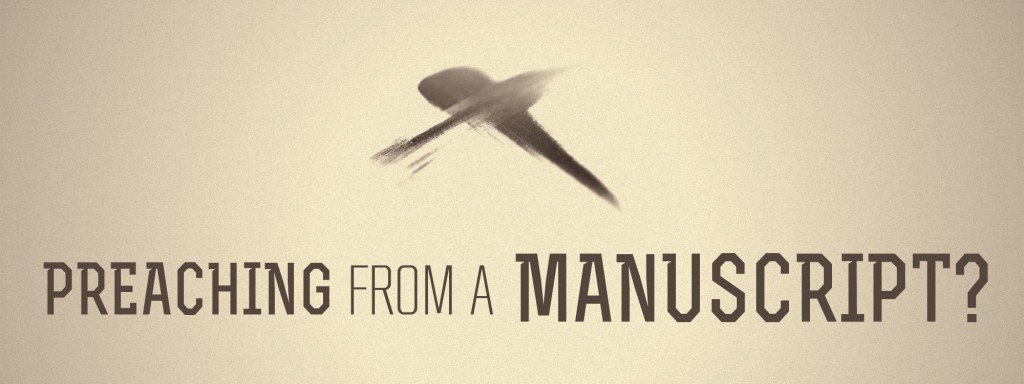Early on in my ministry I purposed to figure out the best method for sermon delivery. I tried everything from a small outline, to a full outline, to a sticky note with one or two quotes, then to nothing altogether.
Looking back on it now I realize that, for some reason, I thought extemporaneous discourse free from notes was the quintessence of skill in preaching.
I now realize that’s just plain silly.
After about eighteen months of trying everything else, I finally tried preaching from a manuscript. What a difference it made! Now, I do need to explain that preaching from a manuscript does not mean reading a document before the church. Jonathan Edwards may have done that during prolific revival years, but Edwards I am not and you are not. Therefore, when I think of preaching from a manuscript I think of preachers going into the pulpit with elaborate notes on which they don’t heavily rely. Just like any other notes you might bring into the pulpit the manuscript exists summons your mind and heart to organized exposition. They are there and they are somewhat invisible. If you preach from a manuscript but your congregation would never think so, you are probably using it properly.
Here are three reasons why I find preaching from a manuscript particularly helpful.
3 MERITS OF THE MANUSCRIPT
1. Clarity. Many men throughout the ages have remarked on the value of writing oneself unto clear thinking, among them are:
- Calvin, citing Augustine: “I count myself one of the number of those who write as they learn and learn as they write.”
- Ed Welch: “I find that there are three levels of clarity. When I only think about something, my thoughts are embryonic and muddled. When I speak about it, my thoughts become clearer, though not always. When I write about it, I jump to a new level of clarity.”
- John Piper: “Writing became the lever of my thinking and the outlet of my feelings. If I didn’t pull the lever, the wheel of thinking did not turn. It jerked and squeaked and halted. But once a pen was in hand, or a keyboard, the fog began to clear and the wheel of thought began to spin with clarity and insight.”
An articulate manuscript will require the preacher to think carefully and clearly about his exposition in a way no other system of preparation will. Preachers who use a manuscript are often accused of being boring, but they are rarely accused of being unclear. Clarity in preachign is a apostolic essential (Col. 4:4) and the accusation of a sermon being unclear is one of the worst things a preacher can hear. A manuscript is a catalyst to clarity in a ways an outline – simple or extensive – can’t possibly be.
2. Sensitivity. Two things come to mind on this point. First, manuscripts help preacher be sensitive to time. For example, I know that a 3,100 word manuscript will lead to a 35-37 minute sermon (the normal sermon length at our church). Another guy who preaches regularly at our church needs about 4,300 word to preach for 35 minutes. To each his own, I guess.
When I go somewhere and am asked to preach for a specific length of time, the manuscript is an invaluable aid to helping me honor the request. It isn’t constraining, it is actually freeing because I need not worry in the moment if I will end up taxing the audience’s attention with undue length.I often tell guys that people will forgive you for just about anything, but most won’t forgive you for a sermon gone too long.
A second point on sensitivity is the ability to get feedback on particularly thorny sections of your exposition. Maybe there is a theological nuance in the text that’s difficult to explain. Maybe there is an application that you want to make sure comes across appropriately. Writing out your thoughts in full allows you to then get well-informed feedback from other brothers and sisters. I can sit someone down in our church and say, “I need your feedback on point I am trying to make, here is what I plan to say . . .” Surely you can get feedback when you don’t manuscript, but I doubt it will be as detailed or informed.
Manuscripts then, aid sensitivity in time and exposition.
3. Usability. Quite simply, it’s easier to reuse a sermon that you manuscripted than one you outlined. Even further, manuscripts can readily be turned into text for newsletters, blogs post, articles, or chapters in a book. A manuscript multiplies the usability of your sermon in ways that no other method of sermon preparation can.

